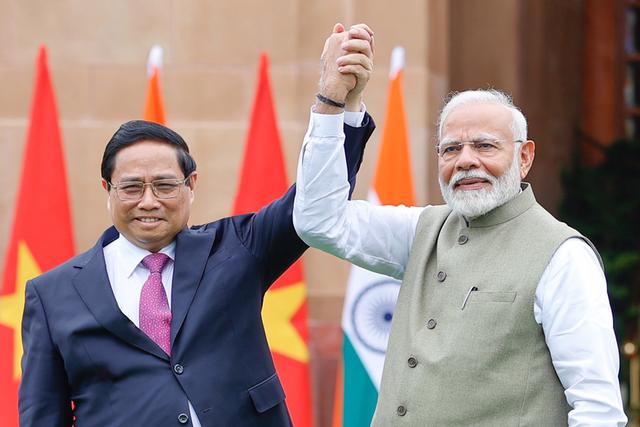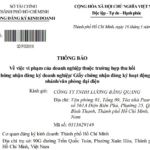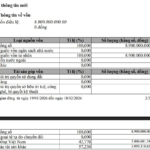Vietnam and India have elevated their relationship to a Comprehensive Strategic Partnership, as evidenced by Prime Minister Pham Minh Chinh’s recent state visit to India from July 30 to August 1. This visit culminated in a Joint Statement outlining agreements reached between PM Chinh and his Indian counterpart, Narendra Modi.
The statement covers a wide range of areas, including political relations, economic and trade cooperation, investment, defense, security, innovation, science and technology, development, culture, tourism, and people-to-people exchanges. Both leaders are committed to strengthening these aspects of the bilateral relationship.
In terms of economic, trade, and investment cooperation, there is a mutual agreement to intensify collaboration at the government and business levels. The goal is to increase two-way trade, investment, and technological partnerships, with a particular focus on raising the current trade volume of around $15 billion. Both sides recognize the need to work closely together to remove trade barriers and create a more conducive environment for bilateral trade. They also agree that the ongoing review of the ASEAN-India Trade in Goods Agreement should result in a simpler and more user-friendly trade regime for both countries.
PM Chinh and PM Modi are dedicated to promoting investment flows between Vietnam and India. Vietnam welcomes Indian investment in various sectors, including infrastructure, high technology, source technology, clean technology, information technology, manufacturing, textiles, and renewable energy. Meanwhile, India is open to Vietnamese investment in agriculture, agro-processing, aquaculture, wood processing, urban development, digital technology, and healthcare.

This exchange of investments solidifies the economic cooperation between the two countries, as stated in the Joint Statement.
India expressed its welcome for Vietnam’s decision to join the Coalition on Disaster Resilient Infrastructure and its progress in joining the International Solar Alliance. Vietnam, in turn, acknowledged India’s Global Bio-fuel Alliance initiative.
As coastal countries, Vietnam and India agreed to enhance their collaboration in oceanography, marine sciences, and the blue economy, as well as capacity building in these areas. They also reaffirmed their mutually beneficial cooperation in the oil and gas sector, encompassing exploration and production on Vietnam’s continental shelf.
The leaders of both countries committed to sharing experiences and best practices in developing regulations and policies that support e-commerce and the digital economy. They aim to facilitate the participation of businesses from both sides in e-commerce and digital platforms, thereby improving export capacity and sustainably integrating into regional and global value chains. Additionally, they encourage cooperation in critical industries such as rare earth elements, semi-conductors, and nano materials.
Innovation and science and technology cooperation are key focuses of the Joint Statement. PM Chinh and PM Modi emphasized the importance of digital technologies and agreed to promote bilateral cooperation in financial innovation and digital payments between Vietnam and India.
Acknowledging the digital transformation and energy transition priorities of both nations, the leaders intend to encourage greater exchanges and collaboration in areas such as digital public infrastructure, space technology applications, renewable energy, biotechnology, and disaster resilience technologies.
Satisfied with the ongoing collaboration in the peaceful use of atomic energy, they plan to further intensify cooperation in this field, as evidenced by the progress in establishing the ASEAN-India tracking, data reception, and data processing facility in Vietnam.
In terms of development, culture, tourism, and people-to-people exchanges, the leaders appreciate the bilateral development cooperation under the Mekong-Ganga framework. They value the quick impact projects, ITEC training, and educational scholarships that have been made possible. The establishment of the Centre of Excellence for Software Development and Training in Ho Chi Minh City and the Army Software Park at Telecommunications University in Nha Trang, with Indian cooperation, were also highlighted.
Encouraging greater exchanges between universities, think tanks, and other institutions, the leaders aim to foster collaboration in line with Vietnam’s vision to become a high-income developed country by 2045 and India’s ‘Viksit Bharat @ 2047’ goal. They also support cooperation on issues pertinent to the Global South.
The increase in direct flights between Vietnam and India has expanded two-way travel and tourism, and both leaders encourage further enhancements in connectivity and tourism between the two countries. Recognizing the historical and heritage bonds, they promote greater exchanges of Buddhist scholars, monks, and pilgrims, including the development of Buddhist and spiritual sites.
Vietnam appreciates India’s commitment to restoring and conserving the My Son UNESCO World Heritage Site, and India values Vietnam’s support for the annual International Day of Yoga celebrations. The leaders expressed their support for increased cooperation between yoga institutions and bilateral exchanges in traditional medicine and medicinal plants. They also agreed to enhance cultural exchanges and media cooperation to further strengthen the relationship between the two countries.















